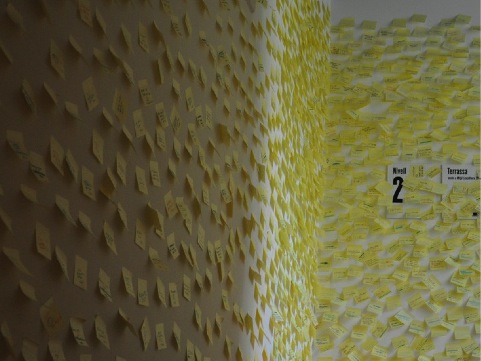
Collective Memory: Archives, Affects, Encounters and Open Source
Documenta Institute Discourse #1 – Lecture by Laurence Rassel (Hörsaal Kunsthochschule Kassel).
“I will have spent my life trying to understand the function of remembering, which is not the opposite of forgetting, but rather its lining. We do not remember. We rewrite memory much as history is rewritten. How can one remember thirst?” Chris Marker, Sunless, 1983
The concept of collective memory regarding the archive of a museum or an art center is not an obvious concept. Most of the people consider the museum or the art center, not as the deposit of a collective memory, of a collective knowledge but as the owner of this content and as provider of service, as provider of order: what it is worthwhile to preserve and display in terms of art and culture finds there its place. How to make understandable, sensitive, visible that the archive of the museums has to be opened, has to be used, can be questioned? How can we - as workers, as citizens, as artists, as educators, as students..- be engaged with any institution critically, actively and creatively?
I will explore first the case of the Fundació Antoni Tàpies between 2008 and 2015 which was in the process of opening the archives, opening the institution. All the documents generated by the activities of the Fundació became a public archive, as they were being digitized or/and physically accessible. The type of documents in the archive includes photographs, technical drawings, floor plans, loan forms, curatorial statements, catalogue proof readings, press clippings, restoration and conservation reports, correspondence, conference recordings, …
These were collected as “physical traces”, “leftovers”, marks of existence of what we defined as events. Events that are happening in time and space in the Fundació.
When I started working in this institution and now working in another institution, an art school institution, I am inspired by open source and free software as a work process model. In a similar way, we open the code, the source of the institution we work with, and ensure its usage by following a free license model. At the Fundacio Antoni Tapies we invited groups and individuals to enter, understand, and use those sources, this knowledge and this institution; now in the school an opening process is experienced with the different actors of the institution: teachers, students, administration team. From the experience of programming the exhibition space and from opening the archive we are mostly interrogating the parameters, the limits of the institution: What if? And if? We are going through the dual nature of the word institution. On the one hand, its creative movement, proper to institute, to found, to establish, is put forward by the present participle of the verb, which names the movement: it is the instituting. On the other hand, the past participle of the same verb comes to designate the result of a creative movement. The instituted is what has crystallized, frozen, established. Alienation occurs when the instituted takes precedence over the institution. It is a true instituting movement that must be at stake for the participants to the institution, participation through reading, caring, using the archive is one of the movements.
-------------
Laurence Rassel is a cultural worker who can act as a curator, teacher or organizer. Currently she is director of erg, the école de recherche graphique, école supérieure des arts in Brussels (www.erg.be). She was director of the Fundació Antoni Tàpies in Barcelona since 2008 till 2015 (www.fundaciotapies.org). And since 1997 till 2008, she was one of the core member of Constant vzw, association for art and media, a non-profit, artist-run organisation based in Brussels since 1997 and active in the fields of art, media and technology.
-------------
documenta Institute Discourse #1
„documenta Institute Discourse“ lädt dazu ein, mit internationalen SprecherInnen über das Archivieren, Forschen und Vermitteln nachzudenken. Dabei können neue und unerwartete Funktionen, Handlungsformen, Strategien und Imaginationen von Archiven, Forschungs- und Vermittlungsinstitutionen zur Sprache kommen. Die öffentliche Veranstaltungsreihe entsteht in Kooperation zwischen der documenta Professur an der Kunsthochschule Kassel und dem documenta archiv. Sie begleitet den Prozess der Entwicklung eines neuen documenta Instituts in Kassel.
Kollektives Gedächtnis: Archive, Affekte, Begegnungen und Open Source
documenta Institute Discourse #1 – Vortrag von Laurence Rassel
21. November 2017, um 18.30 Uhr, im Hörsaal der Kunsthochschule
Selten wird das Archiv eines Museums oder einer Kunstinstitution als Ausdruck des kollektiven Gedächtnisses, als kollektives Wissen, angesehen. Museen und Kunstinstitutionen erscheinen eher als Inhaber von Inhalten oder als Dienstleister, die darüber entscheiden, was lohnenswert ist zu erhalten und was sichtbar gemacht wird, indem es einen Platz erhält. Wie kann verständlich, feinfühlig, sichtbar gemacht werden, dass Museumsarchive geöffnet und benutzt werden müssen und befragt werden können? Wie können wir – als Arbeitende, als BürgerInnen, als KünstlerInnen, als VermittlerInnen, als Studierende … – kritisch, aktiv und kreativ mit diesen Institutionen umgehen?
Laurence Rassel wird anhand der Fundació Antoni Tàpies, die von 2008 bis 2015 ihre Archive und die gesamte Institution geöffnet hat, aufzeigen, welche Ereignisse in Zeit und Raum der Fundació stattgefunden haben, wie die Parameter und Grenzen eines Archivs befragt und wie sie in Bewegung gehalten werden können. Laurence Rassel ist zur Zeit Direktorin der erg, der école de recherche graphique, école supérieure des arts in Brüssel (www.erg.be).